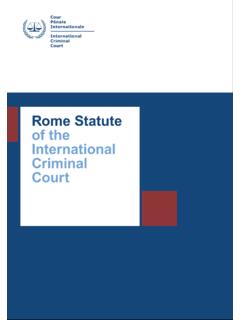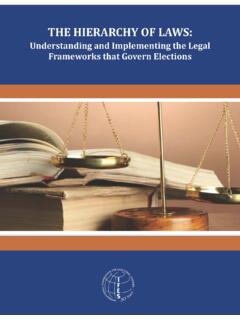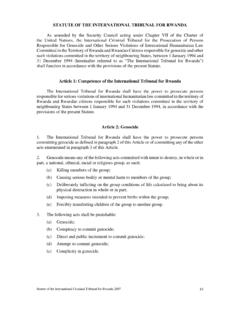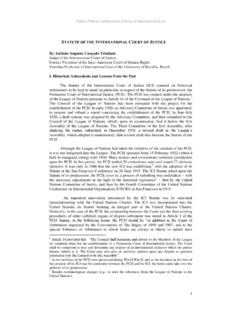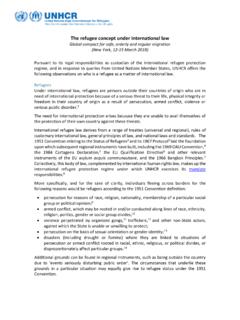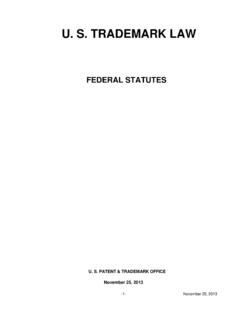Transcription of Statute of the Special Court for Sierra Leone
1 Statute OF THE Special Court FOR Sierra LEONEH aving been established by an Agreement between the United Nations and the Government of Sierra Leone pursuant to Security Council resolution 1315 (2000) of 14 August 2000, the Special Court for Sierra Leone (hereinafter "the Special Court ") shall function in accordance with the provisions of the present 1 Competence of the Special Court1. The Special Court shall, except as provided in subparagraph (2), have the power to prosecute persons who bear the greatest responsibility for serious violations of international humanitarian law and Sierra Leonean law committed in the territory of Sierra Leone since 30 November 1996, including those leaders who, in committing such crimes, have threatened the establishment of and implementation of the peace process in Sierra Any transgressions by peacekeepers and related personnel present in Sierra Leone pursuant to the Status of Mission Agreement in force between the United Nations and the Government of Sierra Leone or agreements between Sierra Leone and other Governments or regional organizations, or, in the absence of such agreement, provided that the peacekeeping operations were undertaken with the consent of the Government of Sierra Leone .
2 Shall be within the primary jurisdiction of the sending In the event the sending State is unwilling or unable genuinely to carry out an investigation or prosecution, the Court may, if authorized by the Security Council on the proposal of any State, exercise jurisdiction over such 2 Crimes against humanityThe Special Court shall have the power to prosecute persons who committed the following crimes as part of a widespread or systematic attack against any civilian ; ; ; ; ; ; , sexual slavery, enforced prostitution, forced pregnancy and any other form of sexual violence; on political, racial, ethnic or religious grounds; inhumane acts. Article 3 Violations of Article 3 common to the GenevaConventions and of Additional Protocol IIThe Special Court shall have the power to prosecute persons who committed or ordered the commission of serious violations of article 3 common to the Geneva Conventions of 12 August 1949 for the Protection of War Victims, and of Additional Protocol II thereto of 8 June 1977.
3 These violations shall to life, health and physical or mental well-being of persons, in particular murder as well as cruel treatment such as torture, mutilation or any form of corporal punishment; punishments; of hostages; of terrorism; upon personal dignity, in particular humiliating and degrading treatment, rape, enforced prostitution and any form of indecent assault; ; passing of sentences and the carrying out of executions without previous judgement pronounced by a regularly constituted Court , affording all the judicial guarantees which are recognized as indispensable by civilized peoples; to commit any of the foregoing acts. Article 4 Other serious violations of international humanitarian lawThe Special Court shall have the power to prosecute persons who committed the following serious violations of international humanitarian directing attacks against the civilian population as such or against individual civilians not taking direct part in hostilities; directing attacks against personnel, installations, material, units or vehicles involved in a humanitarian assistance or peacekeeping mission in accordance with the Charter of the United Nations, as long as they are entitled to the protection given to civilians or civilian objects under the international law of armed conflict; or enlisting children under the age of 15 years into armed forces or groups or using them to participate actively in hostilities.
4 Article 5 Crimes under Sierra Leonean lawThe Special Court shall have the power to prosecute persons who have committed the following crimes under Sierra Leonean relating to the abuse of girls under the Prevention of Cruelty to Children Act, 1926 (Cap. 31): a girl under 13 years of age, contrary to section 6; a girl between 13 and 14 years of age, contrary to section 7; of a girl for immoral purposes, contrary to section 12. relating to the wanton destruction of property under the Malicious Damage Act, 1861: fire to dwelling - houses, any person being therein, contrary to section 2; fire to public buildings, contrary to sections 5 and 6; fire to other buildings, contrary to section 6. Article 6 Individual criminal responsibility1. A person who planned, instigated, ordered, committed or otherwise aided and abetted in the planning, preparation or execution of a crime referred to in articles 2 to 4 of the present Statute shall be individually responsible for the The official position of any accused persons, whether as Head of State or Government or as a responsible government official.
5 Shall not relieve such person of criminal responsibility nor mitigate The fact that any of the acts referred to in articles 2 to 4 of the present Statute was committed by a subordinate does not relieve his or her superior of criminal responsibility if he or she knew or had reason to know that the subordinate was about to commit such acts or had done so and the superior had failed to take the necessary and reasonable measures to prevent such acts or to punish the perpetrators The fact that an accused person acted pursuant to an order of a Government or of a superior shall not relieve him or her of criminal responsibility, but may be considered in mitigation of punishment if the Special Court determines that justice so Individual criminal responsibility for the crimes referred to in article 5 shall be determined in accordance with the respective laws of Sierra 7 Jurisdiction over persons of 15 years of age1. The Special Court shall have no jurisdiction over any person who was under the age of 15 at the time of the alleged commission of the crime.
6 Should any person who was at the time of the alleged commission of the crime between 15 and 18 years of age come before the Court , he or she shall be treated with dignity and a sense of worth, taking into account his or her young age and the desirability of promoting his or her rehabilitation, reintegration into and assumption of a constructive role in society, and in accordance with international human rights standards, in particular the rights of the In the disposition of a case against a juvenile offender, the Special Court shall order any of the following: care guidance and supervision orders, community service orders, counselling, foster care, correctional, educational and vocational training programmes, approved schools and, as appropriate, any programmes of disarmament, demobilization and reintegration or programmes of child protection 8 Concurrent jurisdiction1. The Special Court and the national courts of Sierra Leone shall have concurrent The Special Court shall have primacy over the national courts of Sierra Leone .
7 At any stage of the procedure, the Special Court may formally request a national Court to defer to its competence in accordance with the present Statute and the Rules of Procedure and 9 Non bis in idem1. No person shall be tried before a national Court of Sierra Leone for acts for which he or she has already been tried by the Special A person who has been tried by a national Court for the acts referred to in articles 2 to 4 of the present Statute may be subsequently tried by the Special Court act for which he or she was tried was characterized as an ordinary crime; or national Court proceedings were not impartial or independent, were designed to shield the accused from international criminal responsibility or the case was not diligently prosecuted. 3. In considering the penalty to be imposed on a person convicted of a crime under the present Statute , the Special Court shall take into account the extent to which any penalty imposed by a national Court on the same person for the same act has already been 10 AmnestyAn amnesty granted to any person falling within the jurisdiction of the Special Court in respect of the crimes referred to in articles 2 to 4 of the present Statute shall not be a bar to 11 Organization of the Special CourtThe Special Court shall consist of the following Chambers, comprising one or more Trial Chambers and an Appeals Chamber; Prosecutor; and Registry.
8 Article 12 Composition of the Chambers1. The Chambers shall be composed of not less than eight (8) or more than eleven (11) independent judges, who shall serve as judges shall serve in the Trial Chamber, of whom one shall be a judge appointed by the Government of Sierra Leone , and two judges appointed by the Secretary-General of the United Nations (hereinafter "the Secretary-General"). judges shall serve in the Appeals Chamber, of whom two shall be judges appointed by the Government of Sierra Leone , and three judges appointed by the Secretary-General. 2. Each judge shall serve only in the Chamber to which he or she has been The judges of the Appeals Chamber and the judges of the Trial Chamber, respectively, shall elect a presiding judge who shall conduct the proceedings in the Chamber to which he or she was elected. The presiding judge of the Appeals Chamber shall be the President of the Special If, at the request of the President of the Special Court , an alternate judge or judges have been appointed by the Government of Sierra Leone or the Secretary-General, the presiding judge of a Trial Chamber or the Appeals Chamber shall designate such an alternate judge to be present at each stage of the trial and to replace a judge if that judge is unable to continue 13 Qualification and appointment of judges1.
9 The judges shall be persons of high moral character, impartiality and integrity who possess the qualifications required in their respective countries for appointment to the highest judicial offices. They shall be independent in the performance of their functions, and shall not accept or seek instructions from any Government or any other In the overall composition of the Chambers, due account shall be taken of the experience of the judges in international law, including international humanitarian law and human rights law, criminal law and juvenile The judges shall be appointed for a three-year period and shall be eligible for 14 Rules of Procedure and Evidence1. The Rules of Procedure and Evidence of the international Criminal Tribunal for Rwanda obtaining at the time of the establishment of the Special Court shall be applicable mutatis mutandis to the conduct of the legal proceedings before the Special The judges of the Special Court as a whole may amend the Rules of Procedure and Evidence or adopt additional rules where the applicable Rules do not, or do not adequately, provide for a specific situation.
10 In so doing, they may be guided, as appropriate, by the Criminal Procedure Act, 1965, of Sierra 15 The Prosecutor1. The Prosecutor shall be responsible for the investigation and prosecution of persons who bear the greatest responsibility for serious violations of international humanitarian law and crimes under Sierra Leonean law committed in the territory of Sierra Leone since 30 November 1996. The Prosecutor shall act independently as a separate organ of the Special Court . He or she shall not seek or receive instructions from any Government or from any other The Office of the Prosecutor shall have the power to question suspects, victims and witnesses, to collect evidence and to conduct on-site investigations. In carrying out these tasks, the Prosecutor shall, as appropriate, be assisted by the Sierra Leonean authorities The Prosecutor shall be appointed by the Secretary-General for a three-year term and shall be eligible for re-appointment.


